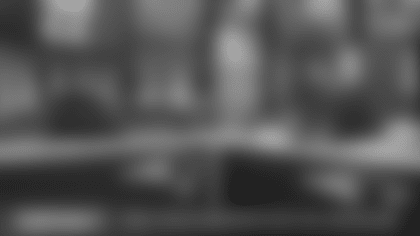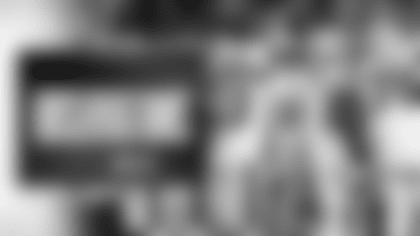BB: Alright, well we finished out the day here today primarily with those [compensatory] picks at the end. I think we added some players that hopefully will be competitive on the team. I look forward to working with them. Our staff, Nick [Caserio] did a good job, and his staff did a real good job of researching everything, finding a lot of information, just scrambling around here at the end on some free agents that weren't drafted. I thought we had a good process. The scouts worked hard. We got a lot of information so hopefully we have some players that can help our team and we'll give them an opportunity and see how it goes.
Q: Malcolm Mitchell seems like an impressive kid both on and off the field. What did you like about him?
BB: He is. Solid kid, yeah, absolutely. He's got a good story. [He] works hard, and [he's] versatile. He's a good player.
Q: How many of these guys that you drafted can have special teams relevance going forward?
BB: I mean we'll see about Malcolm [Mitchell]. Cyrus [Jones] obviously can return.
Q: Are the two trades you made totally independent of each other or do they go hand-in-hand sometimes?
BB: Yeah, totally. The Miami trade was made, I don't know, probably an hour before it would have even gotten to those picks just so that we could plan and they could plan and then really we were very close to picking and Seattle kind of came up and made us the offer into next year so they were very independent. It's just the way that it worked out.
Q: If you make that trade so far in advance are you going up for one particular player?
BB: No. No, absolutely not. When you're trading back there I don't think you're trading for a player. At least then, that particular trade, no, not at all. [You] just kind of trade for value just to either one guy in the fifth or two guys in the sixth, minus the seventh. I'm just saying it's really more of a philosophical thing of where you want to be and just kind of spacing it out a little bit.
Q: Was getting a pick in the 2017 Draft something that came in hoping to accomplish?
BB: We can't control any of that. You just do the best that you can. We do what we feel is best for the team when those situations come up. We can't control what we can't control.
Q: Malcolm mentioned playing in a pro-style offense in college. How important is that in evaluating a player?
BB: I think any time you see a guy in college do something that's similar to what we are doing that helps a little bit. [Brian] Schottenheimer was down there last year and obviously he's a very good coach, runs a pro system. Some guys do, some guys don't. We took [Shaq] Mason last year from the Georgia Tech offense which is kind of the other extreme. Again, you can only control what you can control and everybody's looking at the same tape so you get the same film that the other 31 teams had and the same workouts and you've just got to try and figure it out. Sometimes you have better information on others, especially with as many juniors as there are. That's one less year of information but it's all the same for everybody.
Q: When you take a look at a prospect like Malcolm Mitchell how much does his unique background weight into the decision to draft him?
BB: Again, each player has their own story or their own situations that they've dealt with. But certainly there are guys that overcome things and have to deal with situations. How they deal with it, and how they're able to come out of it, and where they are at whatever point you're evaluating them at that process I think tells you something about the individual. There's no question about that.
Q: What stood out to you about Jacoby Brissett?
BB: We just felt like it was the best thing to do for the team at that point. He's a good player, a good kid. We'll see how it goes.
Q: There seemed to be an outside consensus that running back was a position of need. Was not drafting a running back just a matter of the right guy not being available when you were on the clock?
BB: Yeah, I guess. Again, you can't control what you can't control.
Q: Can you speak at all about the deflategate decision?
BB: I'm talking about the draft. Are you good on that? Good.
Q: What does it show you about a guy like Devin Lucien who was able to pick up a new offense really without even a full season to learn it?
BB: Yeah, I mean that's a very unusual situation. You very rarely see a player do what Devin did. Transfer within the conference. Of course he came back and played really well against UCLA. I think there was a relationship that he had with the quarterback and that certainly benefited him and he had a good year at Arizona State, better than what he had previously had at UCLA. But it's an unusual situation where you have a player like that go in the same conference and so you can kind of see him against the same competition but with a different team and a different offense. It was interesting but he did, he went down there and had a good year with like you said, not much practice, not much lead up. It's good. It's good for him.
Q: Does it tell you that a player takes to coaching well when you see a guy like Elandon Roberts increase his productivity under a new coaching regime?
BB: Yeah, well I think Elandon's a very instinctive player. I think you can see that on film. Whatever his measureables are, he plays to them. He plays fast, he plays strong, and he's very productive in terms of being around the ball so we'll see how all that translates at our level. He seems to be a very instinctive player, a smart player, has good awareness and can find the ball.
Q: Ted Karras comes from an illustrious football family. Did that factor into your decision at all to draft him?
BB: No.
Q: It seemed like you added some depth along the interior portion of the offensive line. How important is it to have depth across that position in particular?
BB: Well you can really never have too much depth in this league. So, we'll see how it goes but I think we'll have a good competitive situation there. Overall, I think [there's] competition on the offensive line. We'll see how it all plays out. Some of those guys play multiple spots. I would say [Ted] Karras, [Joe] Thuney, and then we have a lot of guys that haven't played a lot of spots including [Jonathan] Cooper, [Bryan] Stork, [David] Andrews, [Tre'] Jackson, [Shaq] Mason, even Josh Kline hasn't – he's been primarily a guard. Our tackles have been primarily a tackle even though Cam [Fleming] and Marcus [Cannon] have played guard briefly so having a little more flexibility with some players so we have some moving parts instead of again, there was times where we carried eight lineman in games with the center, guard, and tackle as the sixth, seventh, and eighth guys. When you don't have that kind of flexibility it has a little bit of impact on the roster.
Q: D.J. Foster from Arizona State indicated on Twitter that he may be joining your team.
BB: Yeah, no, I've been all over it studying social media all day. There's nothing I do more than just get on Snapface.
Q: I've seen your Instagram.
BB: Not mine. You've never seen mine. Once that happens just sign the papers. Just sign me out.
Q: Can I ask you about him even though it hasn't been announced?
BB: Obviously, we talk to a lot of players and I'd say until anything gets official and turned in and the contract is signed, all of that which I have no idea. That's an ongoing process and as you can imagine there's 32 teams and hundreds of players and agents and fax machines and phone calls and everything. Sometimes those things get done, sometimes they don't. Sometimes a guy you think you're not going to get you get. Sometimes a guy you think you're going to get you don't get. Sometimes you get the guy you're going to get and you lose the guy you think you're going to lose so we'll just have to see how it all works out.
Q: So you can't trust Twitter?
BB: I haven't seen Snapface or whatever it is so I don't know. Regardless of what's on there we have to go by what the league office [says]. A signed contract is a signed contract.
Q: When it comes to filling out the roster do you look at how the decision to potentially carry three quarterbacks will impact you?
BB: That's way too far away. Right now with the whole rookie class and let's see if we can get them into the locker room, into the meeting rooms, dressed out onto the field, in the huddle, up to the line. I'd say that's – we've got a lot in front of us here.
Q: What is that integration process like for those new rookies that will soon enter the building?
BB: It's huge. They have no idea what they're getting into. It's not their fault. We all had to go through it at some point or another. They're going to get a big dose of what they probably haven't had a whole lot of certainly any time recently. It's a big load. The competition level is going to step up. The volume is going to step up. It's not a scholarship. In college they can't take them away from you. In the NFL you're fighting for a job so it's a whole new ball game. Those guys have a lot to absorb, a lot to learn but just like every other rookie class they'll get through it. We'll have some ups and downs but we'll start the process on Thursday night when they come in. We'll just be grinding away here for the next few weeks.
Q: Do you keep them away from the veterans on the field at all to kind of take them along slowly?
BB: No, I mean the way phase two is set up we can integrate them into some things. There will certainly be plenty of times when they're by themselves as a group to go over the things both in and out of football. Regarding football and outside of football that they need. Education on that they need to, I'd say that they're going to need instruction on and so forth and that'll certainly be geared towards them. But they'll work in with the veteran players and their training in some meetings and on-field work and things like that. So there will be some of that and then they're obviously is going to be a lot of extra and just all of the transitioning. Just coming into a new team from wherever it is that they're coming from and understanding pro football and just the whole transition process. It's a big step for any of us when we do that. Especially for a lot of these guys – some of them haven't made that big of a transition. Some have but some haven't.
Q: Have you found it harder in recent years to make deals for future draft picks?
BB: Each trade, every draft, every trade is different so I don't know if there's any set formula or anything.
Q: Did you guys have to change anything strategically to try and compensate for not having the first round draft pick this year?
BB: No, again you control what you can control. What we had we tried to do the best we could with so that's how we approach it whether it's picking guys or moving positions or trading into next year. Whatever it was we just tried to make the most of it. We traded up, we traded down. We traded into 2017 so I'm not saying it was great or anything but we tried to do the best that we could.
Q: How much did Jimmy Garoppolo's upcoming contract situation play into drafting a quarterback this year?
BB: There's always an element of team planning, especially at that position. If you can you try to look ahead a little bit. If you can't then take it as it comes. Things change but there's an element of planning at all positions on your team, certainly that one.
Q: Do you have any thoughts on the passing of former Patriot Ron Brace?
BB: Obviously, very sad to hear that. It's a young man that died early so it's always tragic. The fact that he was in our lives, part of our family, gives us a heavier heart. Obviously, our thoughts and prayers and sympathy go out to his family. It was sad news. Very, obviously unexpected, it's sad.
Q: Were there more options in this particular quarterback class than in previous years?
BB: I don't know. I really don't sit around and compare draft classes and all that. It's kind of whatever it is, it is. You look at it relative to whatever else there is in that draft and where you are and try to do the best you can. Trying to rank this position against that positon in some other year, I don't know.
Q: Is Kamu Grugier-Hill a safety and a linebacker?
BB: Yeah, he is. He's an interesting player. He is kind of built like a safety, plays like a linebacker. [He] plays a lot down in the box, as a linebacker would. Physically he is probably built a little more like a safety. I think that part of his value to our team would be in the kicking game just based on the position he plays. And then defensively, probably just like a lot of guys, we're just going to have to figure out what the best fit would be. I would say that the traits that he has of being smart, fast, tough, and a good tackler, those are things that we feel we will be able to find a way to utilize those, maybe in some different packages, or matchups, or situations, or whatever it happens to be. I think he's got some things going for him but maybe a little less conventional than some other players and other positions.
Q: Did his testing numbers make you take a second look at him?
BB: Well, again I think it really comes down to how a player plays on the field. From a testing stand point you want to be aware of how those players will physically matchup to your players. Sometimes, you see a player that plays well on film but when you look at him and you look at him physically relative to the other players at your position and it's not very competitive, that gives you a lot of concern about, well he played well but when we put him up against our guys who are significantly better, then is that really going to translate to being good at our level? Maybe, but I'd say a lot of times, the answer is I just don't think so. I think it's relevant but if a guy doesn't play good on film, there are plenty of guys who go and work out and vertical jump and be a work out warrior and not necessarily be a good football player but I would say in his case there's a lot of good football tape to go with it. You know, Eastern Illinois, it's a school that is closely scrutinized now but we have some extra help on that one. Plus, we have a little scouting going on here. Most teams don't have that extra set of eyes.
Q: Do you think international players joining the NFL is a trend?
BB: It seems like you have a couple guys like that every year. The tackle from Manitoba [David Onyemata], I have a little trouble with that pronunciation, but yeah, that's another unusual story. You get guys like that from time to time. I don't know if it's a trend.
Q: You're not adding a global scout yet then you're saying?
BB: No, not yet. Again, because there's really no football outside of the United States. You don't see it. Most time they come here to play but there are a couple guys who either don't play, or back a decade or so ago, there were a few guys from Australia that either kicked or like Australian rules football players, like the Nate Ebner concept. Nate played at Ohio State, so I'm not saying that, but say that he hadn't, you have that same type of athlete. There's always going to be a little of that, basketball guys that don't play football.
Q: How do you evaluate balancing who is already on place on the roster and these draft choices?
BB: Yeah, well, I think that's a good question. I think that on Monday's waiver wire you're going to see a lot of players on it throughout the league because of players that were drafted or acquired or free agents, whatever it happens to be, that other transactions will offset those or be part of the process so we'll just have to see how all of that plays out. There's definitely a little bit of juggling there. I'd say the main thing for me would be that if the player's circumstances change to the point where you don't really think you can give that player a fair opportunity, then it's in your best interest and his best interest to move on and let him find a better opportunity somewhere else. I'd say that's not an infrequent situation. It comes up. It's not going to be 20 guys, but there's a player that's going to end up getting stacked behind a few guys and you're going to be able to really give him the opportunity that you thought you would, at a different point of time, then when things change I think that the player appreciates rather than go through training camp, and get halfway through camp and see what is already evident now then that makes it a lot easier for him now to find a better opportunity. When that's the case, that's how we usually try to approach, I think that league wide that's what you'll see from a lot of team. You'll probably see some guys who are not with a team now go to a team based on some teams not being able to maybe acquire a certain position or need in the draft and then looking to a veteran player who's unsigned to possibly fill that spot, or compete for it.
Q: Is Joe Thuney a better fit on the inside?
BB: Maybe. He's played both and he was going to start at center, I think it was his sophomore year, so he's actually played in there, not in the actual games but he did that. It's a discussion we kind of had with [Matt] Light too. When we drafted Light we kind of thought that we worried a little bit about his length. My wisdom to try to put him at right tackle, try to play him at guard, he was brutal, couldn't do anything. So, we played him back at left tackle and he had a great career. He's going to be on the shorter end of that relative to left tackles. [Logan] Mankins, we played him at left tackle a couple games in a similar situation with him. Left tackle at first, now put him inside. There were points in his career when he went out and played left tackle and played it pretty good. Could he have played left tackle? Probably, but it just didn't work out that way. We'll see. It's a little different in this league than it is in college. A lot of these guys don't meet the dimensions but there are still good football players one way or another so we'll see.
Q: Is the safety/ linebacker hybrid position like Deone Bucannon something that's new, or something that's old but has come back?
BB: I think that you are definitely seeing a strong trend in the league towards corners that play safety or corner-type athletes that play safety, bigger safeties that play linebacker. Both of those are trends. We've always put a lot of premium on the passing game even going back to when we had Eugene Wilson, who played corner at Illinois, and started for us at corner for a couple weeks and then we moved him to free safety, but that was an advantage when teams went to the multiple receivers. Then we already had that third corner on the field and we could go nickel or we could leave our regular defense out there, or leave our corner on the third receiver, what we call penny defense, but things like that. That was really, I'd say, pretty successful for us. Devin [McCourty's] given us some of that, so has [Patrick] Chung. Devin's a corner but not that Chung is a corner, but he has corner qualities, he's had some corner-type responsibilities, particularly in the slot, even going back to when Wes [Welker] was here, and he would cover Wes pretty competitively in practice sessions and things like that. I'd say that has always been something that's, if you have a player that can do that, somewhat appealing. The other problem is if you get mismatched with the receiver against a safety who's not a very good coverage player, then that can blow up in a hurry. Rodney [Harrison] was a guy that you mentioned that was a very good coverage safety even though he was a big physical, and he played the run as well as anybody. He could also cover the run and that's very unusual and that made him very special. You could literally matchup on anybody, receivers, tight ends, blitz him, play him on goal line. He could do it all. He was tremendous. I'd say, yeah, as the offenses have gotten more spread out, as the offenses have put more skill players on the field, as the tight ends have become more athletic and less of the conventional kind of power-blocking type guys, those matchups keep getting tougher and tougher. I'd say there's definitely a movement towards safeties that can play corner or have some corner-like qualities to them and that extends to the linebacker level as well. You see less of the big run stopping Ted Johnson, Brandon Spikes type players. It's just harder when the offense spreads you out and then they go fast and you can't substitute and you're stuck with whoever you have out there, out there. That creates some problems out there, too. The colleges are seeing the same thing and they probably have to deal with it more than we do because there are so many fast-tempo offenses, so they are in the same boat so they are playing a lot of what we call dime defense, or little nickel, or whatever it is, but where they put a lot of fast guys on the field. Ends are playing tackle, safeties are playing linebacker, and corners are playing safety. It's just kind of getting a little bit smaller in a lot of areas. I don't know if that's different., There are some differences but going back to Wilson and Harrison, and those guys from 02-03-04, back in there, there's a lot of similarities to the Chung-Harrison, Chung-McCourty, corner/safety type that had more coverage ability than some other guys that you would see out there.
Q: What does the unknown factor revolving around every new player, such as Joe Thuney, do for a player in terms of being able to define his own role and position on the team?
BB: Right, I think that each situation is different. You can change jobs but you're still doing the same job but it's different working for a different organization. So, what we do, what we ask our guys to do in different positions, is going to be different than what somebody else asks them to do. I think that is just inherent and whether that is our style of play, or the timing of the passing game for an offensive lineman is different for us than it might be for another team. The running game might be a little different than it was, like it was definitely different than what they did at N.C. State, that I know for sure. Regardless, there are some changes that are just different and that's just part of going to a different team and some players adapt to those easily. Some of those have new techniques, some favor the player's moves, some of them sometimes maybe aren't as good as what the system they were in before. That happens too, sometimes. Those things are always hard to predict until you have a player and actually work with him in your system, some players play multiple positions in another system but then when you try to do that with a guy in your system, it doesn't work out as well for whatever the reasons are now. Maybe it's just whatever you're asking them to do – the processing, the nomenclature – I don't know. Sometimes it works out good, sometimes it doesn't. Until you actually get them in that, I don't think you actually know how it's going to go. Maybe a guy does well at one thing but maybe he isn't as comfortable doing something else. Sometimes it takes a while to figure that out. Some guys aren't asked to do a lot and then once they are asked – the Mike Vrabel's of the world, played linebacker at Pittsburgh, and then here he played – run around at free safety at practice, played offense, played defensive end, played linebacker, played inside linebacker. He embraced it and it kind of opened things up for him. That's not always the case with everybody. I think it's very hard to know that for sure. Look, if the guy's played multiple positions in college, let's just say, or with another team, it gives you some idea that he can do it. You can evaluate how he is doing it but it's not always the same when you do it. Even though it looks the same on paper, it's not quite the same. Teamwork; a lot of teamwork is involved. I'd say look shortstop, shortstop, and right. Bases are the same; you line up the same players, shortstop, and shortstop. You start getting out there with 10 other guys versus another 11 guys and they're all moving at once, there are a lot of things involved there. It's a little bit different.
Q: What do you think of Kevin Faulk, Mike Vrabel, and Raymond Clayborn making the Patriots Hall of Fame?
BB: All good. All really good. Clayborn – amazing. Vrabel, Faulk, there's another ten guys you could name too that could easily be considered like [Rodney] Harrison, starting with that, [Bill] Parcells, you can just start throwing names out here. There are a lot of guys that could easily be under consideration that are very worthy Hall of Famers and they probably will be someday.
Q: What did you think of Kevin Faulk's attire last night?
BB: He always makes good decisions. Yeah, he looked sharp out there. Lawyer Milloy turned in the Seahawks pick. I mean, come on. That's all good, it's all good. It's good to see those guys back in the flow. Some of them you haven't seen in, you know guys from other teams that you coached against. Yeah, Richard [Seymour], sure. We'll see a bunch of those guys this year because it's 15 years [since 2001]. I know a lot of those guys – Stacey [James] is organizing that. I'm not sure they won't come back and do something. 15 years, that's a pretty good group there.


































